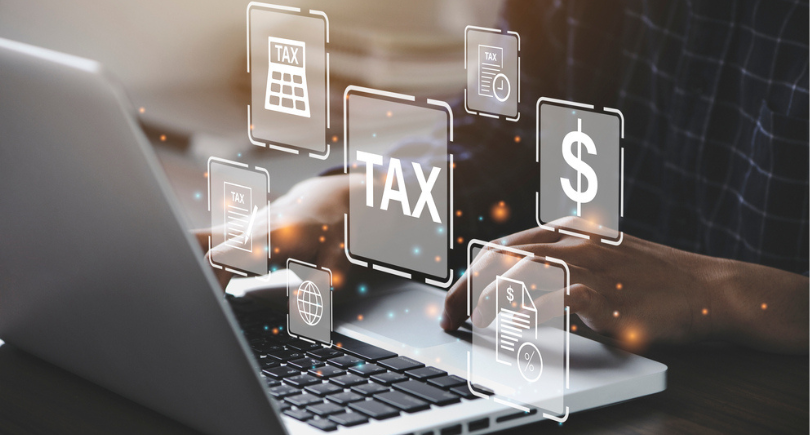
It’s tax season and whether you’re a tax accountant, a tax preparer or a champion at-home tax filer, you’re dealing with all the typical forms and boxes and calculators and questions.
Many people, too, are dealing with questions about how credit cards relate to taxes. What is taxable when it comes to credit card rewards? Is it okay to pay your taxes with your credit card? Plus, what else do you need to know to comply? This guide to taxes and credit cards should help answer those questions.
Are credit card rewards taxable?
One of the key advantages of credit cards is the ability to earn rewards. Whether you’re saving points or miles for travel discounts or earning cash back deals, deciding which credit card rewards fit best into your lifestyle often helps you determine which type of card to use. However, sometimes these rewards you’re earning need to be reported to the IRS. And sometimes they don’t.
“The IRS typically views credit cards as rebates. This means that, in general, you don’t have to report your credit card rewards as income on your taxes,” says Chris Abrams, founder of Abrams Insurance Solutions. “Most rewards are not taxable because they require you to spend money to receive them. You don’t have to report cash back rewards, signup bonuses and travel rewards even though they resulted in financial gain.”
There are, however, some cases where you do need to report credit card rewards to the IRS.
For example, if you’re intrigued by a card that offers a cash bonus just for being approved, with no spending required, you would need to report that bonus as income since it isn’t tied in any way to spending. The same rule applies when receiving a cash bonus for opening a checking account with a particular bank or receiving a bonus for adding an authorized user to your credit card account. Similarly, earning a cash referral bonus from someone else applying for a credit card via your recommendation and referral link could also need reporting.
“You will need to report credit card rewards if you didn’t spend money to get them,” said Mason Miranda, credit industry specialist with Credit Card Insider. “Some credit card sign-up bonuses which don’t require spending are considered taxable, but this is relatively rare.”
If you receive a form 1099 from your credit card issuer, you’ll want to take an even harder look at whether you need to report the rewards as income. Receiving the form doesn’t automatically mean you’ll need to report the rewards as income, but it’s a good reminder to check into it.
When in doubt, ask your tax professional. You don’t want to assume all your rewards automatically don’t apply as taxable income.
“Though cumbersome, it’s best to take your time and research what you should report,” added Miranda. “Consult an accountant to learn how to approach your taxes in your specific situation.”
Things get a little more complicated when dealing with credit card rewards on a business card, according to Abrams. Business credit card rewards are not taxable, but if you use rewards to pay for business expenses it can increase your tax liability because these cards come with different rules.
“If you pay for a business expense partially in rewards, you should deduct the rewards portion of the payment from your tax write-off,” Abrams said. “This can be pretty tedious, so it’s best to just avoid writing off items purchased in part with rewards.”
Can I pay my taxes on a credit card?
Yes, you can pay your taxes with a credit card, but there are some pros and cons to this approach.
As we discussed in the previous section, you can earn rewards if you pay your taxes with a credit card. That cash-back bonus when spending a certain amount within so many months could be an incentive. If you’re looking to earn airline miles, paying your taxes with your credit card can help you do that as well. But there will be a transaction fee any time you pay taxes with a credit card, whether you’re making estimated tax payments or just paying an annual bill.
Therefore, you need to decide if increasing what you owe is worth it.
For his part, Miranda recommends when it comes to credit cards and your taxes, you should avoid using a credit card if you can.
“Though it’s possible, fees will often accompany your payment, which can negate any rewards you would receive for using a credit card,” he said.
The IRS has three companies to choose from for processing the payment of your taxes with a credit card, and those fees for 2022 range from 1.96% to 1.98%.
There are a maximum number of card payments allowed depending on the type of payments you are making and how often you can make them. The IRS has this table you can refer to to see your options. You can’t, however, use card or cash payment methods to make Federal Tax Deposits.
When should you consider using a card to pay your taxes?
Below are a couple of reasons to go ahead and use a credit card to pay your taxes.
1. You’re working on earning a lucrative signup bonus and the spending threshold is higher than what you’ll be able to meet with other spending. Furthermore, consider the value of the signup bonus and whether the rewards you stand to earn are worth more than the roughly 2% fee you’ll pay for the transaction.
2. You have a lengthy 0% APR offer on a card and need some extra time to pay your full tax bill. In this situation, remember first that the IRS has payment plans available if you aren’t able to pay your taxes in full. Qualified taxpayers can apply for an installment plan to pay off their balance over time through these plans. A short-term payment plan (120 days or less) has no setup fee but includes accrued penalties and interest until the tax owed balance is paid in full. Longer-term payment plans have setup fees ranging from $31-$149, along with those accrued penalties and interest until the balance is paid in full.
Before deciding to pay with an intro 0% APR credit card, check to ensure that the fee you’ll pay to make your payment is LESS than the penalties and fees you would pay to use one of the IRS payment plan options mentioned above. Furthermore, and importantly, if you’re paying with a 0% APR offer card, make yourself a plan so that you pay off your full credit card balance before the 0% period ends; otherwise, the interest charges will likely end up costing more than the IRS payment plan fees and penalties.
We’ve rounded up a few cards below that could be good options for paying your taxes if this is the direction you choose to go.
➤ KEEP READING:Reasons to pay your taxes with a credit card
Credit cards, taxes and your business
Credit cards are helpful for separating business from personal expenses and make it easier to see your monthly expenses in one place come tax time, but they could present a few additional questions related to credit card rewards and your taxes.
The rewards themselves likely aren’t taxable, but remember that you can’t deduct expenses paid for with credit card rewards.
“You need to be aware, as a business owner, of everything your business credit card is used for,” said Jake Hill, chief executive officer at DebtHammer. “If you plan to count those purchases as a deduction, you’ll need to verify that they were necessary for your business.”
The major consideration with business credit cards and rewards comes down to how you report business deductions. If you used credit card rewards to buy your flight for business trip, you can’t then claim that flight as a business expense deduction.
Even with that consideration, having a credit card dedicated to your business can still be a good way to stay organized when it comes to expenses and spending and not mixing business with personal, a wise choice in general.
“If you used a personal credit card to make business-related purchases with the intention of earning points or cashback [sic] rewards, and then were reimbursed for the purchases by your employer (but kept the points) there is a chance that the IRS might view that as abusing the system,” says Joshua Zimmerman, managing partner at Westwood Tax & Consulting LLC.
A business credit card also makes record keeping a lot easier when tax time comes along. Having a dedicated business credit card helps you easily see your overhead and helps with the itemization of deductions. Plus you can easily export your monthly and year-end statements making it easier when doing your annual tax return.
➤ LEARN MORE:Can your business expenses affect your personal credit?
What credit cards are best for paying taxes?
If you are going to pay your taxes with your credit card, you want to choose the one that makes the most sense for you. While we, in general, don’t recommend using a card to pay your taxes, we know there are situations when it could make sense for you – in particular, if you’re working to earn a welcome bonus or need a 0% APR period. We’ve rounded up a few cards as possible options:
CardName
discontinued
- Bonus: Earn signup_reward bonus points after you spend signup_bonus_spend_amount on purchases in the first three months from account opening.
- Rewards: Chase Sapphire Preferred offers 5X total points on all travel purchased through Chase Travel℠; 3X points on dining, including eligible delivery services and takeout; 3X points on online grocery purchases (excluding Target, Walmart and wholesale clubs); 3X points on select streaming services; 2X points on travel purchases; and 1X point on all other purchases.
- Annual Fee: AnnualFees
- Credit Needed: CreditScoreNeeded
- Why is this a good choice for tax payments? We recommend this card for tax payments only if you’re working to earn the signup bonus. That’s because those 60,000 bonus points are worth $750 when redeemed for travel through Chase Travel℠ and potentially more than that if you transfer to one of the several travel loyalty partners. For comparison, a 1.96% fee on a $4,000 tax bill is just $78.40, well under the value of that signup bonus.
CardName
discontinued
- Bonus: Discover will match all the cash back rewards new cardholders earn during their first year as a cardholder.
- Intro 0% APR Offer: 0% intro APR on purchases (and balance transfers) for the first 15 months (then, RegAPR) See Rates and Fees
- Rewards: Earn 5% cash back on everyday purchases at different places you shop each quarter like grocery stores, restaurants, gas stations, and more, up to the quarterly maximum when you activate. Plus, earn unlimited 1% cash back on all other purchases.
- Annual Fee: AnnualFees
- Credit Needed: CreditScoreNeeded
- Why is this a good choice for tax payments? This option is all about the intro 0% offer and the bonus, then, RegAPR The 15 months of 0% intro APR on purchases means you can take 15 months to pay off your tax bill without incurring fees and penalties from the IRS. Let assume you have a $2,000 tax bill and using a card incurs that 1.96% fee for a total bill of $2,039.20. Using this card, you’ll earn 1% cash back on the bill, so, $20.39. Then, the matching cash back earned at the end of your first year as a cardholder means you’ll effectively earn $40.78 on this bill alone, and fully offset the fee you paid to use the card. Plus, remember, you were able to take advantage of that intro 15 months 0% interest on your payment, allowing you extra time to pay the bill.
CardName
discontinued
- Bonus: Enjoy $250 to use on Capital One Travel in your first cardholder year, plus earn 75,000 bonus miles once you spend $4,000 on purchases within the first three months from account opening, that’s equal to $1,000 in travel.
- Rewards: Earn unlimited 2X miles on every purchase, every day, plus earn 5X miles on hotels, vacation rentals and rental cars booked through Capital One Travel.
- Annual Fee: AnnualFees
- Credit Needed: CreditScoreNeeded
- Why is this a good choice for tax payments? In this case, the regular rewards would offset a 1.96% fee, but you want to do better than just break even. Therefore, once again, this is about earning the bonus. If the regular rewards offset the fee, the bonus earned will be entirely “profit,” if you will.
CardName
discontinued
- Bonus: New cardmembers can earn 90,000 bonus points after you spend $8,000 on purchases in the first 3 months from account opening. That’s $900 cash back or $1,125 toward travel when redeemed through Chase Travel℠
- Rewards: Cardholders earn three points per $1 on the first $150,000 spent in shipping purchases; advertising purchases made with social media sites and search engines; on internet, cable and phone services; and on travel annually. They also earn unlimited one point per $1 spent on all other purchases. Additionally, cardholders earn 25% more in travel redemption points through Chase Travel.
- Annual Fee: AnnualFees
- Credit Needed: CreditScoreNeeded
- Why is this a good choice for tax payments? That signup bonus is huge, but that spending threshold is daunting. A good-sized tax bill could go a long way toward meeting the $8,000 spend to earn 90,000 points. Given that you only have three months to meet that spend and earn the bonus, a large single transaction might be just what you’re looking for.
CardName
discontinued
- Bonus: New cardholders can earn 80,000 bonus Membership Rewards® points after spending $8,000 on eligible purchases in the first six months of opening an account. American Express is a CardRatings advertiser.
- Rewards: On an ongoing basis, earn five points per $1 on flights booked directly with airlines or through American Express Travel (up to $500,000 spent on these purchases per calendar year). Also, earn five times the points per $1 spent on prepaid hotels booked via amextravel.com.
- Annual Fee: AnnualFees. (See Rates and Fees)
- Credit Needed: CreditScoreNeeded
- Why is this a good choice for tax payments? Once again, the welcome bonus is quite lucrative, but the required spend to earn it is also high. Paying a hefty tax bill with the card could get you closer to the welcome bonus, which is likely to be worth well more than the transaction fee.
Should you use a tax refund to pay down credit card debt?
We’ve talked a lot about paying taxes with a credit card and the implications of rewards on your tax bill, but what if you expect to get a tax refund? How does a credit card play into that scenario.
Here are a couple of things to consider as it relates to a tax refund and your credit cards:
- Do you have an outstanding balance on a credit card? If so, using your tax refund to pay that off (or even just pay it down) could be an excellent use of those funds. Paying off credit card debt as soon as possible will save you money on interest payments and could improve your credit score by reducing your credit utilization and showing good payment habits.
- Are you in the market for a new credit card with an excellent signup bonus offer? If so, using your tax refund to make a big purchase and meet the spending threshold to earn a bonus on a new card could pay off big time. Obviously, you shouldn’t buy things you don’t need just to earn a bonus, but having that tax refund cushion might allow you to make a number of purchases close together so you can meet that spending requirement and still fully pay off your balance.
In any case, taxes can be complicated, even without considering credit card rewards or payment options. It’s always going to be best to consult a tax professional if you have any questions about your unique tax situation.
➤ FURTHER READING:Best ways to use your tax refund
See Rates and Fees of CardName


